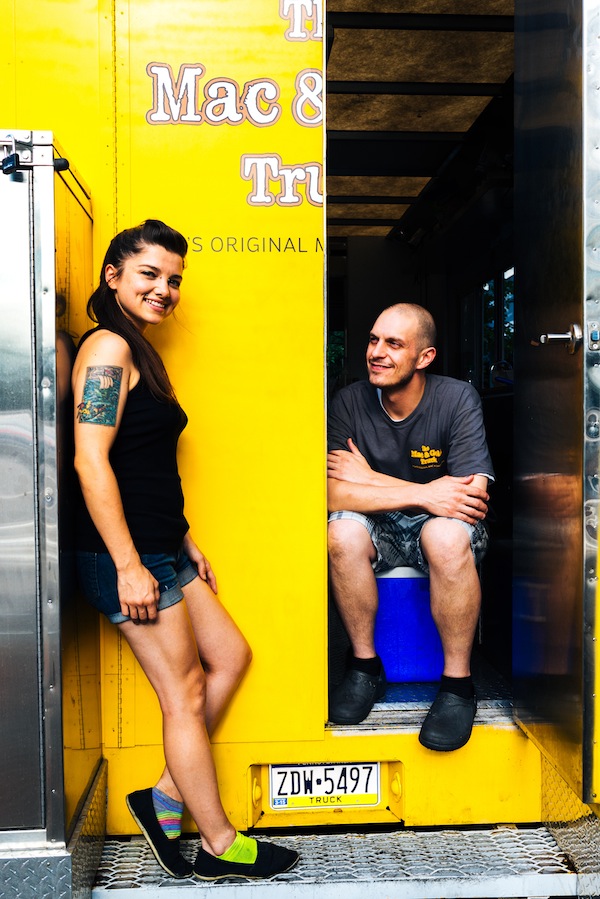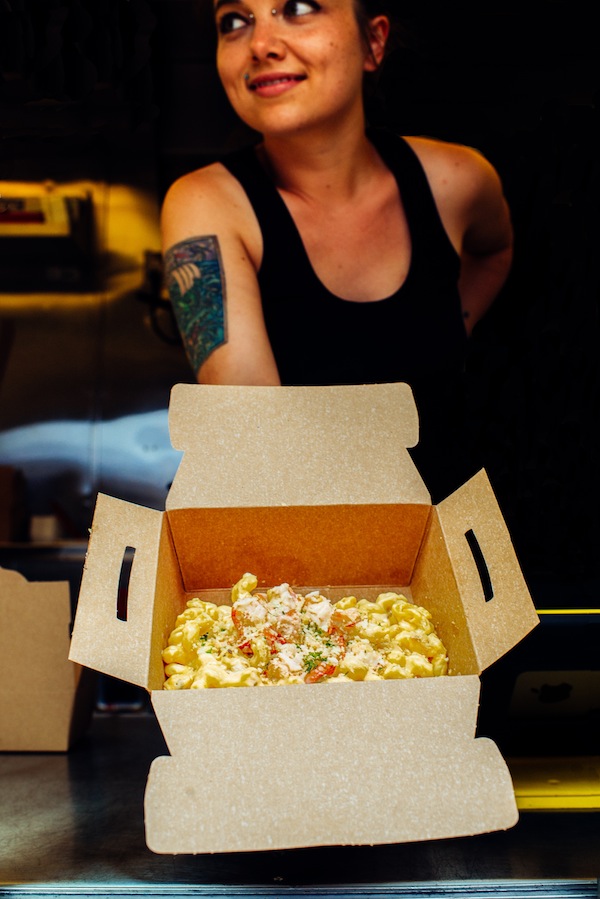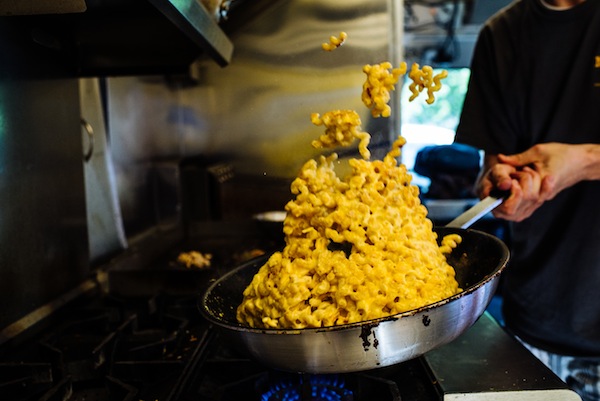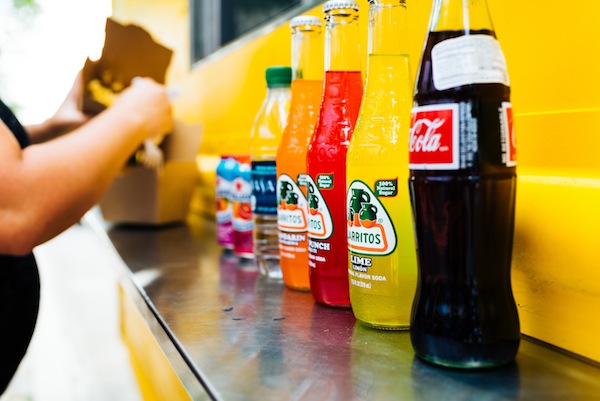Stepping onto the school-bus yellow Mac & Gold food truck just ahead of lunch hour on a hot July day, one will find chef-and-owner Tim Tassone and manager-and-sous chef Athena CE preparing for a crowd of hungry patrons. They chop vegetables and meat, prep their sauces and warm up the burners of the truck’s range.
Tim pulls a bin of pasta from the refrigerator, noting that a full one weighs 22 pounds. They went through six full bins while slinging mac at the Three Rivers Arts Festival in June.
On the truck, the smell of melted cheese, smoky bacon and panko breadcrumbs is overwhelming. The hot stoves meet with the whirl of small fans, creating a low roar and making it slightly difficult to hear. It’s a bona fide restaurant on wheels.
Tassone, born and raised in Pittsburgh, has worked as a cook at a number of local eateries. He says his idea for Mac & Gold was born from creating pasta and Alfredo specials at previous restaurant jobs.
As customers trickle in, there is a palpable buzz. Local workers are clearly excited that the food truck is parked near their jobs, making lunch hour more special. Some patrons — you could call them Mac & Gold groupies — are met with first-name greetings.
Currently, there are 289 Food Trucks operating on the Steel City’s streets, enticing patrons to not only try new cuisines, but also experience exciting takes on old favorites such as hot dogs, barbecue, and mac and cheese. Not only does this culinary trend make great food more accessible to the masses, it also makes entrepreneurship more accessible to chefs and budding restaurateurs.
The perks of being a food truck
According to Tassone, Pittsburgh has embraced the food truck movement. Originally, he had anxiety that mac and cheese would be too “niche,” but for a roving restaurant, it’s a great model. Pittsburgh immediately showed support on social media; Mac & Gold has more than 2,000 followers on Twitter.
At the end of a five-day run, the truck has usually been to five different neighborhoods. That constant movement is a perk for Tassone. He enjoys the freedom of his moveable job site, as well as being his own boss. But choosing a food truck over a brick-and-mortar restaurant also has its challenges, one of the biggest being prep work. They make basically everything from scratch, which means a 4 a.m. start for morning gigs and cleaning into the wee hours after late-night events. Tassone jokes that he has had some multi-event days that create a different spin on the traditional workday: 5 a.m. to 9 p.m.
In addition to fuel and water tank maintenance, food truck operations are also weather dependent. Tassone started Mac & Gold in May, just in time for the summer season. Though the truck prepares hearty food, cold temperatures can mean less people willing to wait for lunch outside. The team is hoping that catering will carry them through the winter.
On the truck in the South Side, CE and Tassone move efficiently as they greet a steady stream of customers. Tassone skillfully prepares food at a brisk pace — the duo is a well-oiled machine.
“We like getting challenged with long lines,” says Tassone with a hint of mischief.
Having fun with your food
When an order is made at Mac & Gold, the pasta is put in a pan and blended with cheese sauce. The toppings are cooked to order on another burner. As the cheese and noodles meld together, they crisp in the pan.
“I like getting a little pan in there,” says Tassone as the cheese slightly browns. He explains that before opening the truck, he wanted to find a portable way to produce a baked mac and cheese flavor. When captured that essence with pan-fried mac and cheese topped with panko breadcrumbs, he felt he’d struck gold — pun intended.
Tassone is also getting creative when it comes to flavor combinations, adding ingredients such as Brussels sprouts, bacon and caramelized onion.
This sort of fun with food is prevalent in the ever-growing Pittsburgh food truck community. The Southside BBQ Company truck, for example, offers an ice cream cone stuffed with mac and cheese, pulled pork and slaw. When you order the Bar-B-Cone, the vendors yell the name — twice.
In addition to puns, Jamie McLeland of The Steer & Wheel says food trucks give chefs the opportunity to have fun with their menu. His online menu lists more than 20 artisan burgers, though only four choices are offered daily.
“[That’s] the beauty of the food truck,” he says. “You don’t have a set menu.” When a fun ingredient comes your way — like ghost pepper jack cheese — you can come up with a special on the spot.
Another place for fun? A catchy name.
“I think the name’s a pretty significant part of the food truck industry,” Tassone says.
A friend coined the name Mac & Gold, a perfect nod to Pittsburgh.
Start your engines
Operating a mobile restaurant may sound breezy, but there are lots of logistical details that have to be ironed out on a daily basis, from picking out your wheels to deciding where to park them. And don’t forget staying up to health code while on the road.
When it came to procuring a truck, Tassone had his ride custom built by East Brunswick, N.J.’s Vending Trucks, Inc. It was manufactured to be compliant with code and was a good way to avoid the costly repairs that sometimes accompany buying a used vehicle.
Parking is another logistic to consider as the proprietor of a food truck. Tassone tries to avoid metered parking, stays off main roads in favor of side streets and only goes to businesses where he’s been invited. Trucks must also have a permanent parking facility to meet health codes.
Joe Witzel, Allegheny County Health Department environmental health supervisor, says trucks must have a stainless steel sink, hand wash sink, commercial refrigeration, cooking equipment and commercial exhaust. With a number of health and safety requirements that food trucks are supposed to keep up with, many of them, both locally as well as globally, might choose to leverage the services of a company such as Sentient (https://www.sentientuk.co.uk/food-hygiene/) to help them perform audits, meet said requirements for compliance, and also gain a better understanding of food hygiene practices.
Food trucks are also required to dump water, prep food and clean cooking equipment at a facility that is already inspected and permitted. Witzel says there are a few places such as restaurants and churches that lease commercial kitchens to vendors, caterers and food trucks. Tassone, a former employee of The Map Room, uses the restaurant as such a venue.
“Some of the food trucks I have seen lately are very, very nice,” says Witzel, noting top-of-the-line kitchen equipment and easy-to-clean stainless steel walls.
Recipe for Success
Just a few months after opening, Mac & Gold’s calendar is full. Tassone credits this success to support from customers and the close-knit food truck community.
“Among trucks, the community is really strong,” he explains.
In addition to food and maintenance advice, truck proprietors help each other get started and connect with food truck venues. Tassone is grateful to his parking garage neighbor and fellow food truck operator Jamie McLeland for showing him the ropes. McLeland warned him that a good looking truck and funny name only go so far, but good food and a clean service get repeat customers. Having said that, if you are looking for Commercial Hood Cleaning in Amarillo or nearby areas to provide a better service to your customers, then you might want to consider a professional cleaning service locally to keep your food truck clean.
McLeland’s truck, the aforementioned Steer & Wheel, is on a mission to serve a burger done better. When McLeland got rolling in spring 2013, he also reached out to a more senior food truck. He credits Franktuary with showing him the tools of the trade.
Like Tassone, after working in food service for a number of years, McLeland wanted to branch out and be his own boss.
“I remember being 25 and being in the same kitchen for five years,” he recalls. He remembers thinking, “I can’t imagine being 40 and still looking at these walls.”
Now McLeland jokes that he is 41 and gets a daily change of scenery. A food truck is open when you decide and has an element of surprise. “Finding new spots [can be] kind of a gamble,” he says. “One day you might be pleasantly surprised and get [slammed] for lunch.”
There is also a closer connection to customer. (“There’s no back of the house … there’s a window,” says McLeland.) Tassone also appreciates that intimacy. With a model like mac and cheese, he serves a lot of families. When catering kids’ birthday parties and festivals, he notes that parents love to experiment with the nostalgic dish, while pickier kids will simply add bacon.
He does hope to eventually open a brick-and-mortar restaurant, but “first, we’ll finish our second month of having a truck,” he says.





